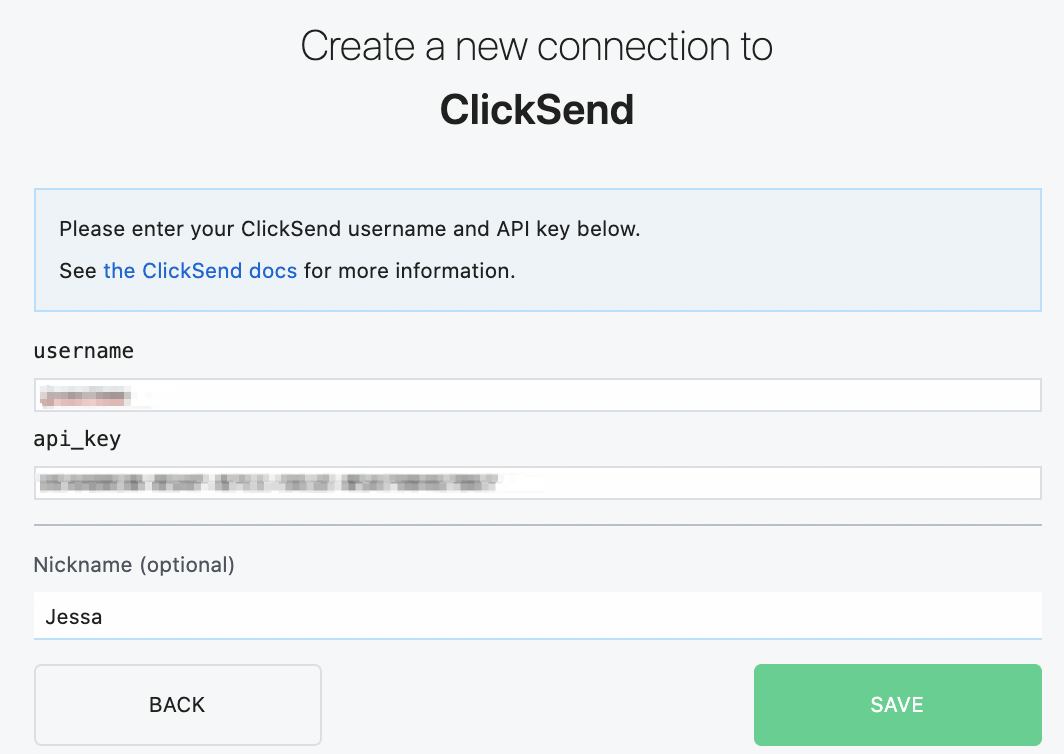What do you want to automate
with ClickSend SMS and OpenAI (ChatGPT)?
Prompt, edit and deploy AI agents that connect to ClickSend SMS, OpenAI (ChatGPT) and 3,000+ other apps in seconds.
Trusted by 1,000,000+ developers from startups to Fortune 500 companies
Popular Ways to Connect ClickSend SMS with OpenAI (ChatGPT)#
Popular ClickSend SMS and OpenAI (ChatGPT) Triggers#
Emit new event for each new incoming SMS message received. See the documentation
Emit new event when a new voice message is received or sent. See the documentation
Emit new event when a new batch is completed in OpenAI. See the documentation
Emit new event when a new file is created in OpenAI. See the documentation
Emit new event when a new fine-tuning job is created in OpenAI. See the documentation
Popular ClickSend SMS and OpenAI (ChatGPT) Actions#
Creates a new contact in a specific list. See the documentation
The Chat API, using the gpt-3.5-turbo or gpt-4 model. See the documentation
Chat using the web search tool. See the documentation
Sends a new MMS to one or multiple recipients. See the documentation
Chat with your models and allow them to invoke functions. Optionally, you can build and invoke workflows as functions. See the documentation
Overview of ClickSend SMS#
The ClickSend SMS API unlocks the potential to integrate robust messaging capabilities into your workflows. With Pipedream, you can not only send SMS messages programmatically but also automate notifications, streamline communication based on events, and much more. Whether you're confirming orders, alerting staff, or engaging with customers, ClickSend and Pipedream make these tasks seamless.
Connect ClickSend SMS#
import { axios } from "@pipedream/platform"
export default defineComponent({
props: {
clicksend: {
type: "app",
app: "clicksend",
}
},
async run({steps, $}) {
return await axios($, {
url: `https://rest.clicksend.com/v3/account`,
auth: {
username: `${this.clicksend.$auth.username}`,
password: `${this.clicksend.$auth.api_key}`,
},
})
},
})
Overview of OpenAI (ChatGPT)#
OpenAI provides a suite of powerful AI models through its API, enabling developers to integrate advanced natural language processing and generative capabilities into their applications. Here’s an overview of the services offered by OpenAI's API:
- Web search
- Function calling
- Text generation
- Embeddings
- Fine-tuning
- Image Generation
- Vision
- Text-to-Speech
- Speech-to-Text
Use Python or Node.js code to make fully authenticated API requests with your OpenAI account:
Connect OpenAI (ChatGPT)#
import { axios } from "@pipedream/platform"
export default defineComponent({
props: {
openai: {
type: "app",
app: "openai",
}
},
async run({steps, $}) {
return await axios($, {
url: `https://api.openai.com/v1/models`,
headers: {
Authorization: `Bearer ${this.openai.$auth.api_key}`,
},
})
},
})
Community Posts#

